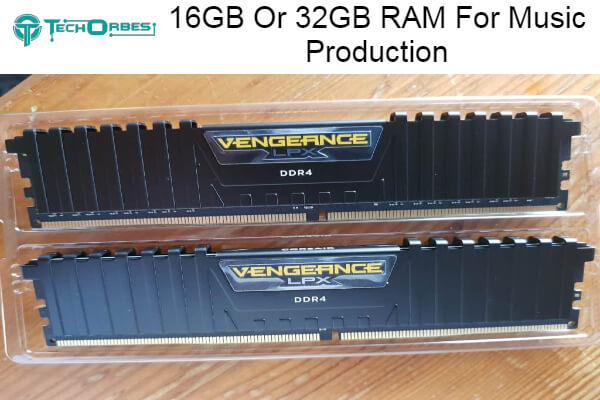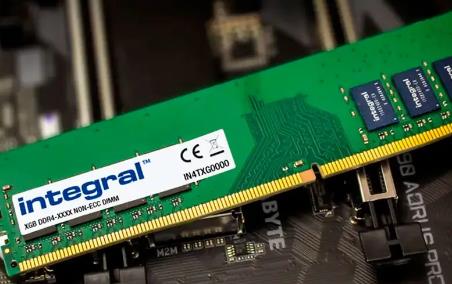16GB Or 32GB RAM For Music Production: Which One Is Better?
You’ll need numerous things for music production, but RAM (random access memory) is one that many novice producers ignore. So, which is better 16GB Or 32GB RAM For Music Production? This critical criterion is frequently missed because it isn’t particularly exciting, even though it is critical for ensuring that your computer or gadget can manage what you’re attempting to do with it.
RAM is critical for music production because it allows the computer to switch between activities rapidly; it improves reaction time, file conversions, mix-downs, and the number of recording and MIDI tracks available. You may face crashes, freezing, and errors if you don’t have enough RAM.
Your recordings will only be as excellent as the tools you use to make them, so having enough RAM on your computer will make the entire process easier.
16GB Or 32GB RAM For Music Production
32 RAM would be better. The more RAM you have, the less latency you get, and you can run a lot more plugins at once. There’s no such thing as excess when it comes to RAM when it comes to creative applications like music, film, or graphic design because you could need it.
I remember when your entire track had to be made (and the program had to operate) on 1MB or less. Now that I have 8GB of RAM, I have 8000 times the RAM I had when I first started, but there are moments when I need a little more, depending on the VSTS I’m using.

What Will Benefit Me More RAM Or CPU?
RAM and CPU are likely to come to mind when considering which expenditure will yield the greatest performance boost. A faster CPU, unlike more RAM, will be immediately obvious to you since everything will seem smoother, and things will be completed faster. Using your CPU too sparingly will result in lag and a generally unpleasant experience.

Even while extra RAM isn’t immediately obvious, it gives you, as a music producer, a lot more alternatives. You’ll have access to tools such as sample-based virtual instruments that you wouldn’t have had access to otherwise. That is why RAM might be a better investment. Generally, upgrading what is bottlenecking your system the most makes a lot of sense.
What About The CPU?
Regarding performance, we can’t talk about RAM without noting the importance of the CPU (central processing unit). When it comes to a smooth production experience, the ‘CPU’ or ‘processor’ plays a big role.
It’s a fantastic experience to have a system that can handle plugins, VSTs, MIDI, and various other heavy programs. A ‘Dual-Core Intel i5 CPU (2.2GHz or above)’ is the minimum processor specs I’ll recommend, which is powerful enough to run most DAWs for smaller projects without crashing or lag.
Dual Or Quad-Core Processor?
It’s also worth noting that the number of cores in a processor determines how fast it runs. A Quad-Core Intel i5 CPU, for example, would outperform a Dual-Core Intel i7 processor since it has an extra pair of cores to split the burden.
For some DAWs, this will help with music production in various ways. When you create an audio or MIDI track in Ableton, the software will assign each audio/MIDI track its processing core.
Do I Need 32GB RAM For Music Production?
No, 32GB of RAM is not a strict requirement for music production. While it can be helpful for handling larger projects and virtual instruments, most music production tasks can be effectively managed with 16GB of RAM. The choice depends on your specific workflow and the complexity of your projects.
Is 16GB RAM Enough For Music Production?
Yes, 16GB of RAM is generally sufficient for most music production tasks. It can handle typical projects, virtual instruments, and audio effects well. However, if you work with very large projects or sample libraries, consider upgrading to 32GB for smoother performance.
Conclusion
Did you decide on 16GB Or 32GB RAM For Music Production? Most people will be fine with 8 GB, 16 GB will likely be enough, and 32 GB or more is reserved for experts or producers with extremely particular demands. Virtual instruments, orchestral libraries, and other software will almost always require a lot of RAM.
Even when looking at laptops, always leaves room for RAM upgrades. If you want a smoother, faster experience, a CPU is a better investment. If you wish to be able to handle a higher workload and employ more advanced tools, RAM is a superior investment.
Frequently Asked Questions
Is 16 GB of RAM sufficient for music production?
Audio jobs are surprisingly tolerant of your system’s memory, despite how critical RAM may appear. For the majority of music production processing, 8 GB is sufficient. If you want to work with big sample libraries to replicate acoustic instruments properly, 16 or 32 GB can help.
How much RAM does Daw require?
Aside from your DAW and a few software synths, you’re unlikely to utilize more than 3GB or 4GB of RAM. However, if you’re building a new PC right now, I’d recommend acquiring two 16GB modules. This will offer you enough headroom and the possibility to add two more slots later to bring your total RAM up to 64GB.
How much RAM does Logic Pro require?
A minimum of 4 GB RAM is required. A graphics card that supports OpenCL or Intel HD Graphics 3000 or later. VRAM is 256MB. A basic installation of Logic Pro X requires 6GB of disk space, and a full Sound Library installation requires up to 63GB of disk space.

Since childhood, I’ve been fascinated by computer technology, and have experimented with a variety of hardware and software. It was a dream come true to graduate from a renowned university with a degree in computer engineering, which made it possible for me to pursue my dreams swiftly.
